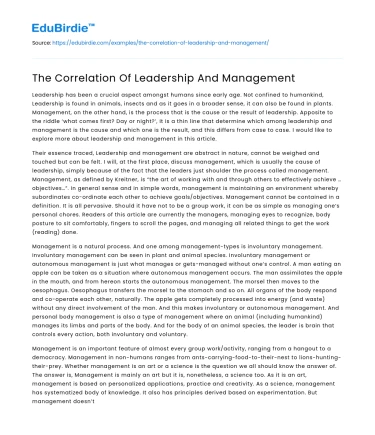Leadership has been a crucial aspect amongst humans since early age. Not confined to humankind, Leadership is found in animals, insects and as it goes in a broader sense, it can also be found in plants. Management, on the other hand, is the process that is the cause or the result of leadership. Apposite to the riddle ‘what comes first? Day or night?’, It is a thin line that determine which among leadership and management is the cause and which one is the result, and this differs from case to case. I would like to explore more about leadership and management in this article.
Their essence traced, Leadership and management are abstract in nature, cannot be weighed and touched but can be felt. I will, at the first place, discuss management, which is usually the cause of leadership, simply because of the fact that the leaders just shoulder the process called management. Management, as defined by Kreitner, is “the art of working with and through others to effectively achieve …objectives…”. In general sense and in simple words, management is maintaining an environment whereby subordinates co-ordinate each other to achieve goals/objectives. Management cannot be contained in a definition. It is all pervasive. Should it have not to be a group work, it can be as simple as managing one’s personal chores. Readers of this article are currently the managers, managing eyes to recognize, body posture to sit comfortably, fingers to scroll the pages, and managing all related things to get the work (reading) done.
Save your time!
We can take care of your essay
- Proper editing and formatting
- Free revision, title page, and bibliography
- Flexible prices and money-back guarantee
Management is a natural process. And one among management-types is involuntary management. Involuntary management can be seen in plant and animal species. Involuntary management or autonomous management is just what manages or gets-managed without one’s control. A man eating an apple can be taken as a situation where autonomous management occurs. The man assimilates the apple in the mouth, and from hereon starts the autonomous management. The morsel then moves to the oesophagus. Oesophagus transfers the morsel to the stomach and so on. All organs of the body respond and co-operate each other, naturally. The apple gets completely processed into energy (and waste) without any direct involvement of the man. And this makes involuntary or autonomous management. And personal body management is also a type of management where an animal (including humankind) manages its limbs and parts of the body. And for the body of an animal species, the leader is brain that controls every action, both involuntary and voluntary.
Management is an important feature of almost every group work/activity, ranging from a hangout to a democracy. Management in non-humans ranges from ants-carrying-food-to-their-nest to lions-hunting-their-prey. Whether management is an art or a science is the question we all should know the answer of. The answer is, Management is mainly an art but it is, nonetheless, a science too. As it is an art, management is based on personalized applications, practice and creativity. As a science, management has systematized body of knowledge. It also has principles derived based on experimentation. But management doesn’t have a universal validity (but differs from case to case) as other sciences do.
Leadership, as defined by Harold Koontz and Heinz Weihrich is “ the art or process of influencing people so that they will strive willingly and enthusiastically towards the achievement of group goals.” In general and in simple words, leadership is the process of leading a group to achieve group goals. The word leading refers to managing a group. Thus, Leadership is management, and leader is the manager.
What does it take to become a good leader? Ordway Tead puts some characteristics of a successful leader as: physical and nervous energy, enthusiasm, sense of purpose and direction, technical mastery, friendliness and affection, decisiveness. Apart from these qualities, other qualities such as motivation skills are also important in influencing people.
Personal management is important in the present-day life. The corporate realm seeks for the personnel, competent enough to manage themselves and to a good extent influence others. Not just in corporate world, a person with good personal management is always sought-after in the society. Personal management has some jargons such as manners, greeting, posture maintenance which are not new to the so-called civilized world. Personal management includes personal hygiene, care. Personal management is nothing more than leading a good life and following a good way of life.
In this rapidly-developing world , management of personal body and behaviour is indispensable obligation of every person. It is not a skill to manage personal behaviour, but it is a way of life that a person chooses among many other ways of life. At the first, a person needs to adopt the living style, then adapt to the same. And the key step to be a leader is, as discussed, a good personal management. It is heart-rending to mention that, in today’s modern world, a person inculcates good behaviour just to profess so, in the corporate life. A paradigm-shift, from pretence to reality, is all what the world needs today. A good personal management makes a person, adept leader. And these leaders can change the world.






 Stuck on your essay?
Stuck on your essay?

